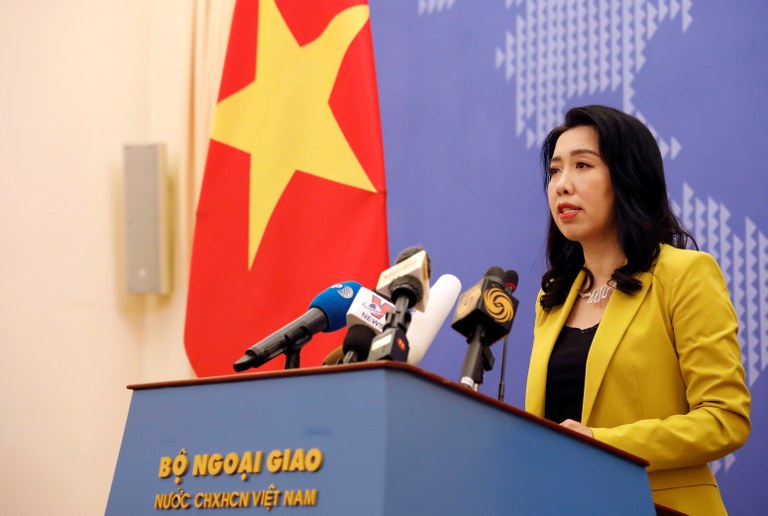Japan and Thailand urged an end to the war in Ukraine and discussed working with the international community to provide humanitarian assistance, Thai Prime Minister Prayuth Chan-o-Cha said after he met with his Japanese counterpart, Fumio Kishida, in Bangkok on Monday. The two countries also signed a defense deal as they reaffirmed their bilateral relationship during Kishida’s trip to Thailand, which coincides with the 135th anniversary of diplomatic relations and ten years of the strategic partnership between the two countries. Kishida arrived in Thailand Sunday evening for a two-day trip after visiting Vietnam, a staunch Russian ally, which nevertheless announced a humanitarian aid package worth U.S. $500,000 to Ukraine during the Japanese leader’s trip. “Concerning the situation in Ukraine, Thailand and Japan reaffirmed the principles of territorial integrity, international law, and the United Nations Charter. Both sides expressed concern over the escalation of tension in the situation and urged all relevant parties to cease all hostilities and violence and exercise utmost restraint,” Prayuth said in the statement. Japan condemned Russia’s Feb. 24 invasion of Ukraine and joined a slew of Western nations in imposing sanctions on Moscow. Thailand, meanwhile, abstained from a United Nations resolution vote to suspend Russia from the U.N. Human Rights Council for alleged human rights abuses in the war in Ukraine. It did however support a strongly worded U.N. resolution that “deplored” the aggression by Russia against Ukraine. Kishida said Japan admired Thailand for supporting the latter resolution. “I agree with Prime Minister Prayuth to denounce the violation of sovereignty and territorial integrity, unilateral use of force in any region, and disapproval of the use of weapons of mass destruction or the threat to use it,” the Japanese PM said. Prayuth also said he had proposed a “new approach towards ending confrontation which calls for the need to change the narrative of the Ukraine situation from conflict to humanitarian consideration for those who are affected by the Ukraine situation.” He said he had a similar approach “to resolve the situation in Myanmar and attached importance to humanitarian assistance for the people of Myanmar.” He did not give details about the so-called approach. Thailand shares a 2,400-kilometer (1,500-mile) long border with Myanmar. It has not outright condemned the coup in Myanmar or the actions of its security forces, which toppled the elected National League for Democracy (NLD) government on Feb. 1, 2021. Before arriving in Bangkok, the Japanese PM visited Hanoi where he spent fewer than 24 hours. He was received by all three of Vietnam’s top leaders, including the prime minister, the president, and the chairman of the national assembly. Speaking about Vietnam’s commitment of humanitarian aid for Ukraine, a Vietnamese analyst, Le Dang Doanh, said that Kishida’s visit helped Russian ally Vietnam “adjust its stance towards the Ukrainian war.” South China Sea At a meeting with his Vietnamese counterpart Pham Minh Chinh and the other Vietnamese leaders, Kishida also discussed the issue of the disputed South China Sea, and the need for a free and open Indo-Pacific. Vietnam shares interest with Japan in safeguarding maritime security in the South China Sea, where China holds expansive claims and has been militarizing reclaimed islands. China is involved in maritime disputes with Japan over the Senkaku/Diaoyu Islands in the East China Sea. China claims sovereignty over nearly all of the South China Sea, where Brunei, Malaysia, the Philippines, Taiwan and Vietnam all have claims. In Bangkok Monday, Kishida said that Japan along with Thailand hoped to “achieve the goal of [a] free and open Indo-Pacific and will closely cooperate to handle the matters of the South China Sea and North Korea and nuclear weapon and ballistic missile tests.” Defense deal Meanwhile the new defense equipment deal announced by Kishida and Prayuth would help facilitate the transfer of hardware and technology from Japan to Thailand, but the leaders provided no details. The deal “would support the strengthening of defense cooperation between the two countries and incentivize Japanese investment in the Thai defense industry, which is one of the targeted industries,” Prayuth said in a joint press conference held at the Government House in Bangkok on Monday evening. “The signing of our defense equipment and technology transfer agreement is a major step forward in expanding bilateral defense cooperation,” Kishida said. The two countries will later decide on the specific types of equipment for transfer. Apart from the defense deal, the two leaders also witnessed the signing of agreements to deepen financial cooperation between Japan and Thailand. Additionally, Japan gave Thailand COVID-19 emergency support worth 50 billion yen (U.S. $384 million) in loans and 500 million yen in grants aid, according to a joint statement. The two leaders discussed improvements in agricultural supply chains and agreed to continue working together on the Mekong sub-region, “particularly in promoting connectivity, human resource development, and sustainable development,” the statement said. Japan is Thailand’s biggest foreign investor, followed by the United States and Singapore. According to the Thai commerce ministry, Japanese investors represented 28.6 percent of the overall foreign investment in Thailand, worth more than 82.5 billion baht (U.S. $ 2.39 billion), in 2021. Japan’s investments, especially in the automotive industry, have been vital to Thailand’s economic growth in the last several decades.


